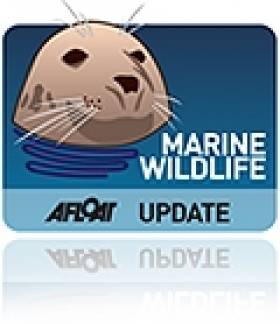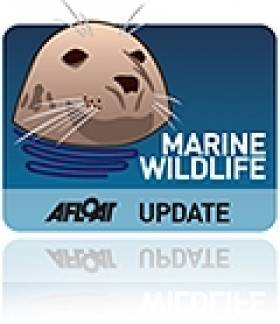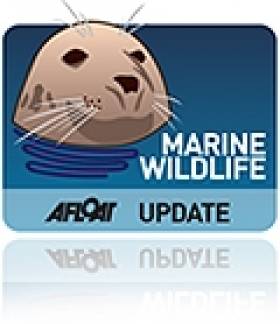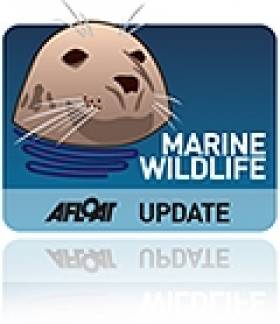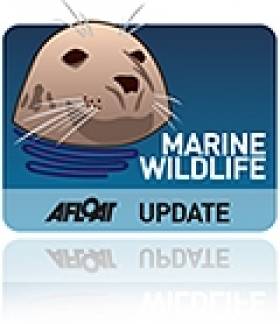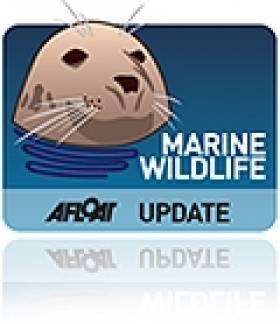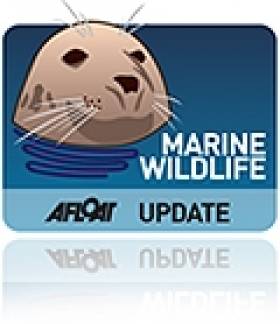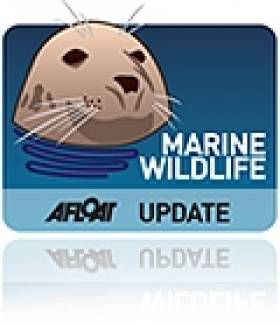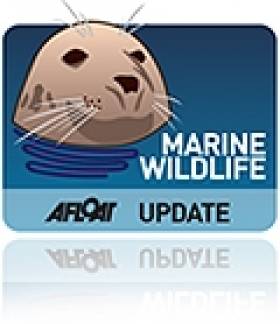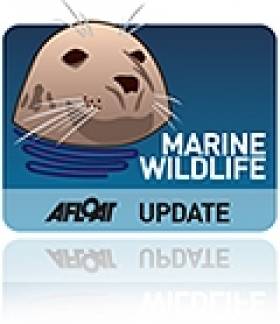Displaying items by tag: seals
Manx Seal Pup Death Rate Highest In Six Years Says Group
#MarineWildlife - Seal pup deaths around the Isle of Man are at their highest level in six years, prompting concerns for the health of the marine mammals on the Irish Sea island, as BBC News reports.
"Particularly harsh" weather conditions battering the usually sheltered islet frequented by female seals rearing pups have been blamed for the "greatest number of mortalities" since surveys began, according to the Manx Wildlife Trust.
And it's feared that the coming weeks will being more sad news for seal pups on the Calf of Man. BBC News has more on the story HERE.
ISS Makes Case For Seals Amid Renewed Cull Calls
#MarineWildlife - The Irish Seal Sanctuary (ISS) has lambasted "uninformed calls" for a seal cull along the west coast after a TV report on the loss of fishermen's catch in the Blasket Islands.
The sanctuary's founder and director spoke out after the report on the story by RTÉ News, which follows renewed calls by Kerry South TD Michael Healy-Rae to control protected seal populations in the interest of fishermen's livelihoods.
In a statement, Brendan Price said the ISS was "appalled at the report" on last night's Six One News in which RTÉ was "taken to a hotspot to fish by dated, passive gear [gill nets, which are] unsustainable and extremely damaging, just like drift nets of old."
Price also dismissed claims that seals are taking as much as 60 per cent of the available catch, saying the actual figure is "more like one per cent" of the national catch.
"[Some fishermen] may lose 60 per cent of their catch", Price agreed. But he claimed the real reason for this loss was "fishing by unsustainable method, up under the noses of the seals."
In calling for "balance in this debate" and expressing his group's availability for participation, Price also urged for fairness to the plight of west coast fishing communities, to which he says the ISS has "repeatedly offered help and solutions and is active in their support".
"[Let's] argue for fairer share of national catch, investment, grants, etc for them," he said. "But let's be honest also in stating figures and what they represent and not go shooting the messenger, the relatively harmless seal."
However, while criticising RTÉ's handling of the story, Price went out of his way to acknowledge "the professionalism of the reporter Seán Mac an tSíthigh, with whom I did speak" after the report aired.
Kerry TD Repeats Call For Seal Cull
#MarineWildlife - Kerry TD has reiterated his call for a seal cull in the West of Ireland to help preserve a fishing industry that's been badly affected by weeks of extreme weather.
According to TheJournal.ie, Deputy Michael Healy-Rae said a rise in seal numbers along the coast "is affecting fishermen's livelihoods" and that a cull in their numbers is "badly needed".
However, the ISPCA says there is "no evidence" that seals are having a detrimental effect on fish stocks off the west coast, adding their belief that the animals are being "scapegoat-ed".
TheJournal.ie has much more on the story HERE.
#MarineWildlife - Inland Fisheries Ireland (IFI) funded the Coastal and Marine Research Centre (CMRC) and University College Cork, in conjunction with partners in UCC's School of Biology, Ecology and Environmental Science (BEES) and the Marine Institute to undertake a two-year pilot study to investigate seal predation on salmon stocks in the Moy and Slaney estuaries.
In the study, which began in August 2011 and continued to August 2013, salmonids were found in the diet of both grey and harbour seals using identification of salmonid bones recovered from the scat (faeces) of seals collected at seal haulout sites in the Moy and Slaney.
Salmonids were recovered in relatively low numbers, representing only 1.6% of the total prey numbers in the Slaney in Co Wexford and less than 5% in the Moy in Co Sligo. But due to the large size of individual salmonids, they comprised approximately 15% of the total prey biomass consumed.
The presence of salmonids in the diet of seals is likely to represent consumption of both salmon (Salmo salar) and sea trout (Salmo trutta), with contribution to the diet related to seasonal abundance.
Genetic techniques were employed to confirm salmonid species identification based on hard structures, with both salmon and sea trout DNA being detected in scats.
The removal of salmonids by seals, or other predators, must be placed into context of the amount removed by fisheries. In the Moy, 6,564 salmon were caught (non-release) by rod fisheries (five-year average, P Gargan IFI pers comm) which is likely to be far higher than that removed by seals in the area.
However, smaller salmon population units are most vulnerable to predation, and even low levels of predation by 'specialist' seals (or other predators) could have disproportionately large effects on small salmon population units such as in the Slaney.
The full report is available to download as a 4.3MB PDF file HERE.
Stranded Seal Rescued By Brothers Returns To Open Water
#MarineWildlife - The baby seal rescued by three brothers on the Dingle Peninsula three months ago has been released back into the sea, according to the Irish Independent.
Back in October, Afloat.ie related the rescue of the stranded seal pup by the O'Sullivan brothers Marwin, Leon and Rory while they were on a family break in Kerry over the October bank holiday weekend.
Named Lena by seven-year-old Rory, the seal was taken into the care of the Dingle Wildlife and Seal Sanctuary, who nursed her back to health after a serious bout of the flu among other ailments.
And now she's back swimming in the Altantic, while some 30 other seals - victims of the recent stormy weather - continue to receive TLC at the sanctuary.
The Irish Independent has more on the story HERE.
Arklow Lifeboat Volunteers Help Rescue Seals Trapped In Fishing Gear
#MarineWildlife - Arklow RNLI were involved in the rescue of two seals caught in fishing gear close to the lifeboat station.
Volunteer crew at the Wicklow-based station were made aware yesterday afternoon (21 November) that the seals were apparently trapped in the fishing nets.
Deteriorating weather conditions nixed the feasibility of launching the lifeboat Ger Tigchelaar to rescue the weary animals, so the decision was made to attempt a rescue from the rocky shoreline.
A local surfer who was in the area assisted three RNLI volunteers and members of the public with attaching a heaving line to the fishing gear, which was then hauled onto the treacherous rocks.
The seals were then carefully freed from the netting one at a time by the RNLI crew members Michael Fitzgerald, Liam O’Neill and Austin Gaffney, who said they were delighted that they were "successful in saving both the seals lives”.
Both seals had a short break on the lower rocks of the shoreline before making for open water.
RNLI volunteers kept the public back to ensure the seals had the best chance of surviving their ordeal.
Brothers Come To Rescue Of Stranded Seal Pup
#MarineWildlife - A stranded baby seal rescued by three brothers on the Dingle Peninsula was one of five washed up around the Irish coast during the stormy bank holiday weekend, as the Irish Independent reports.
Fifteen-year-olds Marwin and Leon O'Sullivan from Co Cork quickly got in touch with the Dingle Wildlife and Seal Sanctuary when they found the female grey seal pup, still with its fur coat, alone on Clogher Strand.
She's since been named Lena by seven-year-old Leon O'Sullivan and is in the care of the Dingle sanctuary, who said another pup was found on a beach in Mayo yesterday 29 October.
Seven Seal Pups Released In Sligo
#MarineWildlife - The Irish Independent has a wonderful photo to accompany the video above of seven orphaned seal pups returned to the sea to rejoin their colony off Co Sligo after they were rescued and reared by the Dingle Wildlife and Seal Sanctuary.
All seven seals had been abandoned during the summer - at least one because its mother was scared off by reckless personal watercraft users.
That seventh seal, named Toby, was rescued from the dunes near Strandhill by the Walton family, to whom he became very attached. And the occasion seemed to get a bit much for him as he initially refused to leave the care of his human companions.
The Irish Independent has much more on the story HERE.
Dingle Seal Sanctuary Welcomes New Arrivals
#MarineWildlife - Wildlife enthusiast Karl Grabe has posted on YouTube video of newborn seal pups rescued by the Dingle Wildlife and Seal Sanctuary last week.
Named by staff at the sanctuary as Salt, Pepper, Sugar and Cocoa, the four are as cute as buttons - and anyone who visits over the summer can see them or others like them, such as two-week-old Molly who's also featured in the above clip.
#MarineWildlife - The Irish Seal Sanctuary has told Radio Kerry that it is no longer looking for the culprits behind the shocking sea beheadings in Dingle last summer.
As reported on Afloat.ie one year ago, staff at the Dingle Wildlife and Seal Sanctuary were sickened by the gruesome sight of two baby seal heads nailed to signs outside the facility.
Johnny Woodlock of the Dingle Seal Sanctuary later claimed that the horrific discovery was part of a "swing in activity in recent months" where dead seals were found on beaches around the country with "apparent gunshot wounds".
However, the founder of the Irish Seal Sanctuary has said that the group is no longer actively seeking the perpetrators of the barbaric Dingle incident.
"It's not a high priority for me any longer," said Brendan Price of the Irish Seal Sanctuary, who added that rewards for information are "posted from time to time when incidents like this have occurred".
Price continued: "I wouldn't be looking for some kind of public atonement. I don't think it's helpful to keep rewards up any longer, and I'm sure that it will not happen again."


























